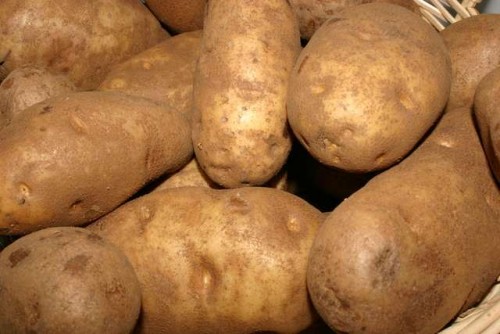|
POTATO >> Initiation into habits of work and usefulness
TOMATO >> External, natural wisdom
 THE SOLANUM FAMILY THE SOLANUM FAMILY
To the Solanum family belong the Potato and the Tomato, also a long list of narcotics, among them Tobacco, Belladonna, Hyoscyamus, and Stramonium. These plants have so important a place in modern life that it is worthwhile to give them some attention. They all have narcotic properties—even the potato leaves and seeds being poisonous. In general, they produce a soothing, stupefying, dreamy condition, in the extreme amounting to coma or paralysis; or, in the reaction, a state of irritability, wild excitement, and delirium.
THE MANDRAKE
The only mention of this family in the Word appears to be that of the mandrakes which Reuben found in the field in the time of wheat harvest, and brought to his mother Leah. They are mentioned also in Solomon’s song. The Mandrake is believed to be the same as the Mandragora, which is not uncommon in Palestine. It has a long, forked, fleshy root, with a bunch of leaves close to the ground—the flowers and fruit growing on slender stalks among the leaves. The flowers are said to be dingy white with purple veins, and the fruits pale orange, about the size of small crabapples. The fruit is regarded as possessing amatory powers, and is much esteemed by Orientals. Swedenborg speaks of it as used in Genesis to represent “the things of conjugiallove” (Arcana Coelestia #3942; Apocalypse Explained #434), which is indicated also by its common reputation. No very elevated wisdom can be represented by such ground fruit, but rather the most external wisdom of love and its duties.
THE POTATO
Potatoes grow upon underground stems, and are made up of buds with a deposit of starch to ensure their growth. The plants produce seeds, yet the chief means of propagation is the planting of the tubers; and these tubers are the useful, nutritious product of the plant. This seems to indicate a method of propagation in the works they represent, not so much by instruction, and the communication of principles, as by an unthinking initiation into habits of work and usefulness, as children are initiated at home, and others by companionship. Their growing underground indicates the entire lack of spiritual elevation and intelligence in such productions.
Starch, of which the potatoes are largely composed, is in itself a wholesome nutriment and, as we have seen, has a correspondence with the satisfaction of good work—here it is the satisfaction of faithfulness to the interests into which one is initiated. Such blind initiation and faithfulness go together in very many of the modern combinations of society. Churches and political parties, clans and cliques, neighborhoods and nations, as well as families, all train the young to some extent in this way. They introduce them into their own ways of thinking and living, not as a matter of principle, but as a matter of association for common benefit. Some proportion of this blind allegiance enters into almost everyone’s life, especially in children and the simpleminded; and faithfulness to it constitutes a part of his self-satisfaction. But potatoes are liable to rapid decay; and this is true also of the allegiance of the young and the simple, when more knowledge of the world is given them. The potato plant also has in it sufficient poison to produce stupidity or delirium; and there is a similar spiritual narcotic in a blind and exclusive devotion to one’s family or party or clan.
TOMATOES
Tomatoes grow upon plants very like the Potato plants. They are the fruit and not an underground tuber, and are almost entitled to a rank among refreshing fruits, instead of among vegetables. Usually, however, they are cooked, and frequently are used as sauce for more substantial viands. They represent some external, natural wisdom; and their bright red color, as well as their family, indicates that it is wisdom of domestic affection. It is neither comprehensive nor spiritual in quality; but simply the bright sociability of natural affection, which helps to make home cheerful and harmonious.
Author: JOHN WORCESTER 1875
|